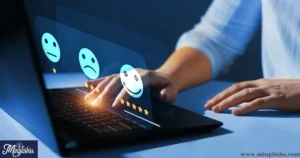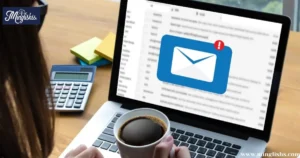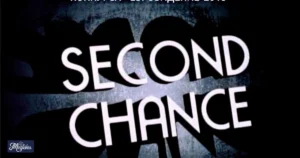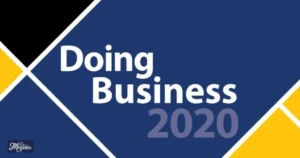,,Finding the right words to express your intentions can make all the difference in communication.,,
Effective communication is essential in both personal and professional settings. When you want to keep someone informed or ensure that a conversation continues, you often say, “I will follow up with you.” While this phrase is clear, it can become repetitive and may lose its impact over time.
Exploring alternatives can help you sound more engaging and thoughtful. In this blog post, we will delve into various ways to convey the same message, allowing you to enrich your vocabulary and enhance your interactions.
Now, you might wonder why it’s necessary to find different ways to say something that seems straightforward. The truth is, language evolves, and so do our communication styles. Using varied phrases not only keeps your conversations fresh but also demonstrates your attention to detail and willingness to connect with the other person.
By diversifying your language, you can build stronger relationships and foster better collaboration, whether in the workplace or in your personal life.In this article, we’ll present 35 alternatives to “I will follow up with you,” complete with scenarios and explanations. Each point will provide insight into when to use these phrases effectively.
We’ll also include additional tips to help you choose the best option based on context. So, whether you’re drafting an email, making a phone call, or engaging in face-to-face conversations, you’ll find valuable expressions to enhance your communication skills.
1. “I’ll check in with you soon.”
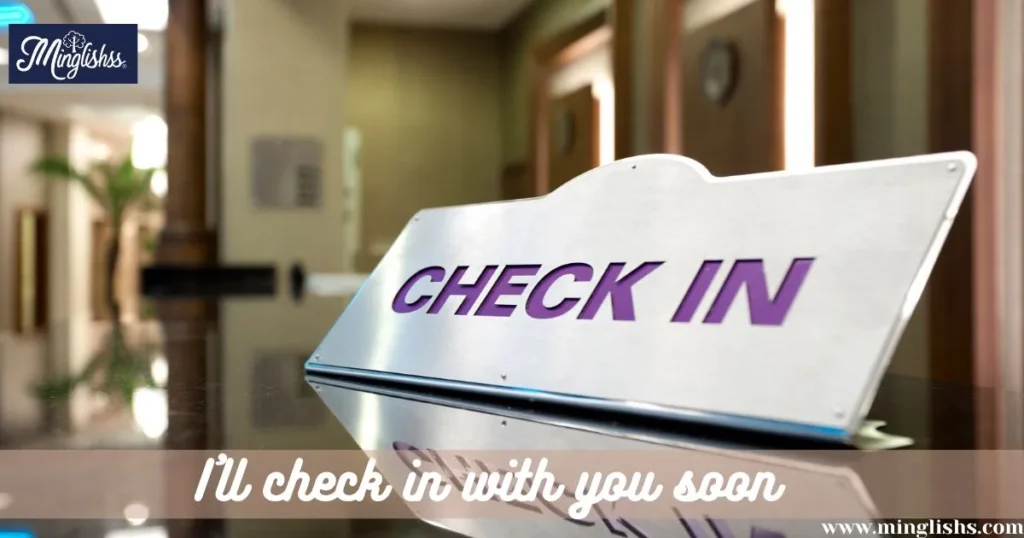
Scenario:
You just wrapped up a meeting with your colleague, Sarah, about an important project. You want to ensure she knows you’ll be around to discuss any updates.
Subject Explanation:
Using “I’ll check in with you soon” is a friendly and informal way to express your intent to reconnect shortly. This phrase shows you care about the ongoing dialogue and that you’re invested in the project’s progress. It conveys a sense of approachability, making it easier for Sarah to reach out if she has questions.
Additional Tips:
To strengthen this phrase, consider adding a specific timeframe. For example, “I’ll check in with you in a couple of days.” This approach sets clear expectations and helps establish accountability.
2. “Let’s touch base later.”
Scenario:
After a brainstorming session, your manager, Tom, expresses the need for more input on the project. You want to assure him that you’ll revisit the topic.
Subject Explanation:
“Let’s touch base later” is a casual phrase that indicates your willingness to reconnect without sounding overly formal. It’s perfect for collaborative environments, emphasizing teamwork and open communication. Tom will appreciate your proactive approach to revisiting the ideas discussed.
Additional Tips:
You can make this phrase even more effective by suggesting a specific date or time to reconnect. For example, “Let’s touch base later this week.” This will help both parties prepare for the conversation.
3. “I’ll keep you updated.”
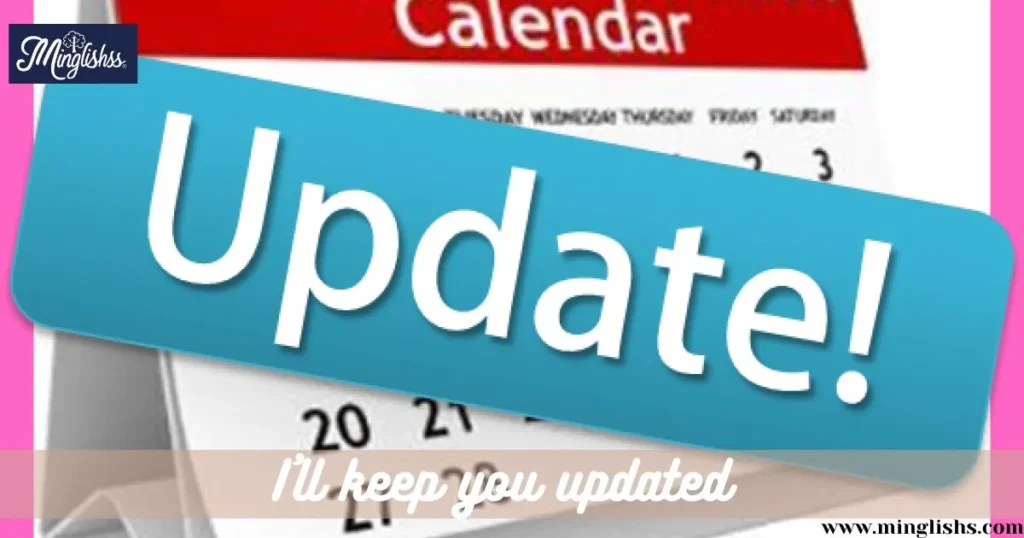
Scenario:
You are working on a report that your client, Lisa, is eager to see. You want her to know you’ll share progress with her.
Subject Explanation:
Saying, “I’ll keep you updated” assures the recipient that you’ll provide ongoing information. It shows your commitment to transparency and reinforces trust. This phrase is particularly effective when dealing with projects that require constant communication.
Additional Tips:
Consider following up this phrase with a commitment to the next update. For instance, “I’ll keep you updated and share the first draft by Friday.” This level of detail reinforces accountability.
4. “I’ll reach out again soon.”
Scenario:
During a networking event, you meet David and discuss potential collaboration. You want to ensure he knows you’ll follow up.
Subject Explanation:
Using “I’ll reach out again soon” is a simple and straightforward way to express your intent to connect again. It indicates that you value the interaction and plan to continue the conversation, making it appropriate for both casual and formal settings.
Additional Tips:
If you have a specific follow-up method in mind, such as an email or phone call, you can include it in your statement. For example, “I’ll reach out again via email next week.”
5. “I’ll circle back to you.”

Scenario:
In a team meeting, your teammate, Kevin, brings up a point that requires further exploration. You want to reassure him that you’ll revisit it.
Subject Explanation:
The phrase “I’ll circle back to you” is commonly used in professional environments. It suggests that you plan to revisit a topic, ensuring that nothing important falls through the cracks. This expression conveys your attentiveness and willingness to engage further.
Additional Tips:
To make this phrase more effective, specify when you’ll circle back. For instance, “I’ll circle back to you after I’ve gathered more information.”
6. “I’ll follow up shortly.”
Scenario:
After discussing a proposal with your boss, Angela, you want to confirm that you’ll get back to her soon with additional details.
Subject Explanation:
Saying, “I’ll follow up shortly” is a clear and concise way to indicate that you’ll return to the conversation soon. It shows respect for the other person’s time and conveys that you are committed to providing the necessary information.
Additional Tips:
You can enhance this statement by specifying the next step. For example, “I’ll follow up shortly with the revised proposal.”
7. “I’ll reconnect with you soon.”

Scenario:
You just had a great conversation with an old friend, Mark, and want to keep the momentum going.
Subject Explanation:
“I’ll reconnect with you soon” implies a desire to maintain the relationship and continue the dialogue. It’s warm and friendly, making it suitable for both personal and professional contexts. Mark will appreciate your intent to keep in touch.
Additional Tips:
Consider suggesting a specific method of communication. For example, “I’ll reconnect with you soon over coffee.”
8. “I’ll send you an update.”
Scenario:
You’re collaborating on a project with a colleague, Emily. After discussing the timeline, you want to reassure her that you’ll keep her in the loop.
Subject Explanation:
By stating, “I’ll send you an update,” you’re promising to share relevant information as it becomes available. This phrase is effective for email communication and demonstrates your commitment to keeping others informed.
Additional Tips:
To strengthen this phrase, specify the type of update you’ll send. For instance, “I’ll send you an update on the project milestones by the end of the week.”
9. “I’ll keep the lines of communication open.”
Scenario:
After discussing a project with your supervisor, Rachel, you want her to know you’re available for questions.
Subject Explanation:
Saying, “I’ll keep the lines of communication open” emphasizes your readiness to continue the dialogue. This phrase shows that you value ongoing communication and collaboration, reinforcing a positive working relationship.
Additional Tips:
Consider complementing this phrase with a specific invitation for questions. For example, “Feel free to reach out if you have any questions in the meantime.”
10. “I’ll be in touch.”
Scenario:
After a successful meeting with a potential client, Jonathan, you want to assure him of your continued interest.
Subject Explanation:
“I’ll be in touch” is a versatile phrase that works well in both professional and personal contexts. It indicates that you plan to continue the conversation and maintains a sense of connection, encouraging Jonathan to look forward to your next communication.
Additional Tips:
You can make this phrase more impactful by specifying the next step. For example, “I’ll be in touch to schedule our next meeting.”
11. “I’ll drop you a line.”
Scenario:
You’ve just had a lovely conversation with your neighbor, Lisa. You want to keep the conversation going.
Subject Explanation:
Saying, “I’ll drop you a line” is a casual, friendly way to express your intent to follow up. It suggests a lighthearted approach to communication, making it perfect for informal situations with friends or acquaintances.
Additional Tips:
You can specify the method of communication for clarity. For instance, “I’ll drop you a line via text.”
12. “I’ll follow up after I’ve had some time to reflect.”
Scenario:
You just finished a challenging meeting with your team. You want to assure them that you’ll get back to them after considering their input.
Subject Explanation:
This phrase acknowledges the need for thoughtful reflection before responding. It shows that you take their opinions seriously and want to provide a well-considered follow-up. Your team will appreciate your intention to engage thoughtfully.
Additional Tips:
To enhance this phrase, you might want to specify a timeframe. For example, “I’ll follow up after I’ve had some time to reflect, probably by Friday.”
13. “I’ll get back to you shortly.”
Scenario:
During a discussion about budget allocations, your boss, John, requests additional data. You want to confirm that you’ll return with that information soon.
Subject Explanation:
“I’ll get back to you shortly” is a direct and professional way to express your intent to follow up. It assures the other person that you are committed to providing the necessary information promptly.
Additional Tips:
Consider adding a specific timeframe to this phrase. For instance, “I’ll get back to you shortly, by the end of the day.”
14. “I’ll keep you in the loop.”
Scenario:
You’re working on a team project with Melissa, and you want to assure her that you’ll share important updates as they arise.
Subject Explanation:
Saying, “I’ll keep you in the loop” conveys a commitment to ongoing communication and transparency. This phrase is particularly effective in collaborative environments where teamwork is crucial.
Additional Tips:
To make this phrase more effective, specify the type of information you’ll share. For example, “I’ll keep you in the loop regarding our project progress.”
15. “I’ll make sure to follow up.”
Scenario:
After a client meeting, you want to confirm to your team that you will address any outstanding questions.
Subject Explanation:
By stating, “I’ll make sure to follow up,” you’re expressing your commitment to address any concerns or questions raised during the meeting. This phrase reinforces your accountability and responsiveness.
Additional Tips:
You can enhance this statement by specifying what you’ll follow up on. For example, “I’ll make sure to follow up on the client’s feedback.”
16. “I’ll reach out for clarification.”
Scenario:
After receiving feedback on a project, your colleague, James, suggests you ask for more details. You want to assure him you’ll take action.
Subject Explanation:
Saying, “I’ll reach out for clarification” indicates your willingness to seek further information to ensure you understand the feedback. It demonstrates a proactive approach to communication and a desire for accuracy.
Additional Tips:
Consider mentioning who you’ll contact for clarification. For example, “I’ll reach out to the client for clarification on their request.”
17. “I’ll make a note to follow up.”
Scenario:
During a strategy meeting, your supervisor, Angela, emphasizes the importance of revisiting certain points. You want to reassure her that you’ll remember to do so.
Subject Explanation:
“I’ll make a note to follow up” indicates that you value the discussion and plan to take action. This phrase reassures others that you’re attentive and responsible for follow-up tasks.
Additional Tips:
You can make this phrase more powerful by mentioning what you’ll note. For instance, “I’ll make a note to follow up on the marketing strategy.”
18. “I’ll touch base with you after I gather more info.”
Scenario:
You’ve been tasked with researching a potential partnership. You want to confirm that you’ll reach out once you have the necessary details.
Subject Explanation:
This phrase communicates your intent to gather information before following up. It shows that you’re committed to being thorough and providing informed responses in future conversations.
Additional Tips:
To enhance this statement, specify when you expect to have the information. For example, “I’ll touch base with you after I gather more info by next week.”
19. “I’ll follow up as soon as I can.”
Scenario:
After discussing a critical deadline with your team, you want to assure them that you’ll reach out promptly.
Subject Explanation:
Saying, “I’ll follow up as soon as I can” expresses urgency and commitment. It shows that you understand the importance of timely communication, especially regarding deadlines.
Additional Tips:
To reinforce this phrase, you might want to clarify your availability. For example, “I’ll follow up as soon as I can, likely by the end of the day.”
20. “I’ll be reaching out shortly.”
Scenario:
After a successful presentation, you want to confirm to your audience that you’ll share the slides and additional resources.
Subject Explanation:
“I’ll be reaching out shortly” is a confident statement indicating your intent to provide further information soon. It helps set expectations and reassures others that you are prepared to continue the conversation.
Additional Tips:
Consider mentioning what specific information you’ll share. For example, “I’ll be reaching out shortly with the presentation slides.”
21. “I’ll make sure to follow up.”
Scenario:
You just wrapped up a discussion with your team about a client’s needs. You want to affirm your commitment to address them.
Subject Explanation:
This phrase conveys accountability and reinforces your intention to follow through on commitments. It’s a strong statement that communicates dedication to the project and your team.
Additional Tips:
You can strengthen this phrase by mentioning the specific follow-up action. For instance, “I’ll ensure to follow up on the client’s requests.”
Other Ways to Say “Thank You for Your Business”
22. “I’ll check back in.”
Scenario:
After a conversation about potential changes to a project, your coworker, Linda, wants to know if you’ll revisit the topic.
Subject Explanation:
“I’ll check back in” is a casual, reassuring way to confirm your intent to revisit the discussion. This phrase fosters an ongoing dialogue and shows that you value the input received.
Additional Tips:
To enhance this phrase, you might want to suggest a timeframe. For example, “I’ll check back in next week.”
23. “I’ll follow up to keep you informed.”
Scenario:
You are working on a project that involves multiple stakeholders. You want to confirm your intent to keep everyone in the loop.
Subject Explanation:
Using “I’ll follow up to keep you informed” emphasizes your commitment to transparency and ongoing communication. It shows that you recognize the importance of sharing relevant updates with others.
Additional Tips:
To enhance this statement, consider mentioning what information you’ll share. For example, “I’ll follow up to keep you informed about our progress.”
24. “I’ll reach out for further discussion.”
Scenario:
After a conference, you meet a potential collaborator and want to assure them of your interest in continuing the conversation.
Subject Explanation:
“I’ll reach out for further discussion” is a professional way to express your intent to reconnect. It shows that you’re invested in exploring opportunities and keeping the dialogue open.
Additional Tips:
To strengthen this phrase, you might specify how you’ll reach out. For example, “I’ll reach out for further discussion via email.”
25. “I’ll connect with you again soon.”
Scenario:
You had a productive meeting with a mentor, Sarah, and want to confirm your intention to maintain contact.
Subject Explanation:
This phrase indicates your desire to continue the relationship and shows that you value the insights shared during your previous conversation. It’s warm and approachable, making it suitable for both personal and professional contexts.
Additional Tips:
Consider adding a specific timeframe for when you’ll connect again. For instance, “I’ll connect with you again soon to discuss my progress.”
26. “I’ll be following up with additional information.”
Scenario:
You’re working on a proposal that requires input from your team. You want to confirm your intent to share updates as they develop.
Subject Explanation:
This phrase assures others that you’ll provide more information as it becomes available. It’s clear and straightforward, reinforcing your commitment to keep everyone informed.
Additional Tips:
To enhance this statement, specify what type of information you’ll share. For example, “I’ll be following up with additional information on our budget by next week.”
27. “I’ll get in touch soon.”
Scenario:
You just finished an important phone call with a potential partner, Jake, and want to assure him of your interest.
Subject Explanation:
Saying, “I’ll get in touch soon” is a friendly way to confirm your intent to follow up. It conveys enthusiasm and commitment, making it suitable for both personal and professional contexts.
Additional Tips:
Consider mentioning the method you’ll use to get in touch. For example, “I’ll get in touch soon via email.”
28. “I’ll make it a point to follow up.”
Scenario:
After a discussion about a team project, your coworker, Maria, emphasizes the importance of keeping everyone updated.
Subject Explanation:
This phrase reinforces your intention to prioritize communication and follow-up. It shows that you recognize the significance of ongoing dialogue and are committed to taking action.
Additional Tips:
To strengthen this statement, mention the specific area you’ll follow up on. For instance, “I’ll make it a point to follow up on our project timeline.”
29. “I’ll reconnect as soon as I can.”
Scenario:
After a networking event, you meet someone you want to collaborate with, Paul. You want to reassure him that you’ll reach out soon.
Subject Explanation:
“I’ll reconnect as soon as I can” is a positive statement indicating your intent to maintain contact. It emphasizes your eagerness to continue the dialogue, making it suitable for both personal and professional situations.
Additional Tips:
To enhance this phrase, consider mentioning what you’ll discuss when you reconnect. For example, “I’ll reconnect as soon as I can to discuss potential collaboration opportunities.”
30. “I’ll follow up with a summary.”
Scenario:
After a lengthy meeting, your boss, Emily, wants a recap of the discussions. You want to confirm that you’ll provide it.
Subject Explanation:
This phrase indicates your commitment to summarizing key points and ensuring everyone is on the same page. It’s professional and shows that you value clarity and communication.
Additional Tips:
To make this phrase more effective, specify when you’ll send the summary. For example, “I’ll follow up with a summary by the end of the day.”
31. “I’ll send you a reminder.”
Scenario:
After discussing deadlines, you want to reassure your coworker, David, that you’ll remind him as the due date approaches.
Subject Explanation:
Saying, “I’ll send you a reminder” indicates that you’ll keep track of important dates and ensure the other person stays informed. This phrase fosters accountability and teamwork.
Additional Tips:
To strengthen this statement, consider mentioning when you’ll send the reminder. For example, “I’ll send you a reminder a day before the deadline.”
32. “I’ll follow up after the meeting.”
Scenario:
After a planning session, your supervisor, Lisa, expresses the need for updates. You want to confirm that you’ll provide them.
Subject Explanation:
This phrase communicates your intent to follow up after a specific event. It shows your commitment to keeping everyone updated and reinforces the importance of communication in teamwork.
Additional Tips:
To make this statement more effective, specify what you’ll follow up about. For instance, “I’ll follow up after the meeting regarding the project timeline.”
33. “I’ll make sure to touch base later.”
Scenario:
You had an initial discussion about a project with a colleague, Kelly, and want to confirm your intent to revisit the topic.
Subject Explanation:
“I’ll ensure to touch base later” indicates that you plan to keep the lines of communication open. It fosters a collaborative atmosphere and shows you value the other person’s input.
Additional Tips:
To enhance this phrase, consider suggesting a timeframe for when you’ll touch base. For example, “I’ll ensure to touch base later this week.”
34. “I’ll follow up once I have more details.”
Scenario:
After discussing a new initiative, your manager, Ryan, asks for updates. You want to assure him that you’ll reach out when you have further information.
Subject Explanation:
This phrase emphasizes your commitment to staying informed and keeping your manager updated. It’s a professional way to indicate that you’ll be in touch as new information becomes available.
Additional Tips:
To strengthen this statement, mention what details you’re waiting for. For example, “I’ll follow up once I have more details about the budget proposal.”
35. “I’ll be in touch shortly.”
Scenario:
After meeting with a potential client, you want to assure them of your intent to connect again soon.
Subject Explanation:
“I’ll be in touch shortly” conveys a sense of urgency and commitment to ongoing communication. It reassures others that you value the relationship and intend to keep the conversation going.
Additional Tips:
To make this phrase more impactful, you can specify how you’ll be in touch. For example, “I’ll be in touch shortly via phone.”
Pros and Cons
Pros:
- Clarity: Using different phrases can help clarify your intent and the context of your follow-up.
- Professionalism: Variations can make your communication sound more polished and professional.
- Engagement: Creative alternatives can engage the recipient, making them more likely to respond positively.
Cons:
- Misinterpretation: Some phrases may be misunderstood if not used in the right context.
- Overcomplication: Using too many variations can confuse the recipient rather than clarify your intent.
Answers To Key Questions “I Will Follow Up With You”
1: Why should I vary my follow-up phrases?
Varying your follow-up phrases helps keep your communication fresh and engaging. It can also clarify your intent and the context of your message, making it more professional.
2: When is it appropriate to follow up with someone?
It’s appropriate to follow up after meetings, discussions, or any communication where further action or information is needed. Following up shows your commitment to the conversation and reinforces accountability.
3: How can I ensure my follow-up is effective?
To ensure your follow-up is effective, be clear about what you’re following up on, provide specific details, and choose a phrase that fits the context of your communication. Additionally, consider setting a timeframe for when the recipient can expect to hear from you.
4: What should I include in a follow-up message?
In a follow-up message, include a summary of the previous conversation, any relevant updates or information, and a clear call to action if necessary. Make sure to express appreciation for the recipient’s time and input.
5: How often should I follow up with someone?
The frequency of your follow-ups depends on the context and urgency of the matter. Generally, it’s best to follow up at regular intervals, such as weekly or bi-weekly, until you receive a response or resolution. Be mindful not to overwhelm the recipient with too many messages.
Conclusion
In professional communication, saying, “I will follow up with you” can often feel repetitive. By incorporating alternative phrases, you can convey your intent while keeping your communication fresh and engaging.
Whether you are confirming a discussion, assuring someone of your responsiveness, or maintaining a relationship, these alternatives can enhance your message’s clarity and professionalism. The key is to choose the phrases that best fit the context and your relationship with the recipient.
Incorporate these alternatives into your communication style to foster better relationships, promote transparency, and demonstrate accountability in your professional interactions. Remember, effective communication is about clarity and engagement—using varied phrases can significantly impact your interactions.

Hi, I’m Ethan Matthews: I make English easy with my clear and simple teaching style. I love helping learners feel confident in every lesson.


